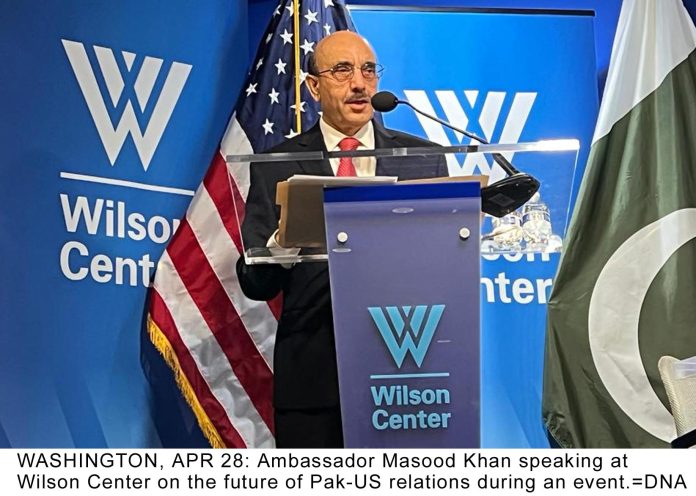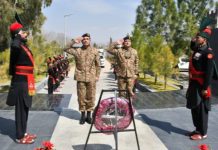
Cautions about serious perils of policy of imbalance in South Asia
WASHINGTON, APR 28 (DNA) — Pakistan’s Ambassador to the United States Masood Khan said it was important that the US restores – for Pakistan – Foreign Military Financing and Foreign Military Sales, suspended by the previous Administration.
Addressing a conference on “The Future of Pakistan-US relations” at renowned US thin-tank Wilson Centre in Washington, he cautioned about serious perils of policy of imbalance in South Asia. He also urged US to “revive its role on strategic stability in South Asia”.
He said after a brief period of uncertainty, Pakistan and US were successfully recalibrating and rejuvenating relations in wake of changing circumstances. Terming Pak-US ties as “a relationship of the future generations”, he said the results in a short span of time were impressive.
Referring to frequent high level contacts between Foreign Minister Bilawal Bhutto Zardari and US. Secretary of State Anthony Blinken, Pak-US dialogues on health, energy, climate change, counter-narcotics, counterterrorism and defence and the recently held Trade and Investment Framework Agreement Ministerial Council meeting, the ambassador said that these processes were producing results and defining pathways for future growth.
He highlighted confluence of shared values and ideas that bind the people of Pakistan and the United States and brought them into alliances for advancing shared strategic purposes including rolling back aggression in Afghanistan and combating the scourge of terrorism.
The ambassador said that Pakistan’s foreign minister would be attending the Shanghai Cooperation Organization (SCO) Conference in Goa in early May. He said his country valued the US encouragement to India and Pakistan to engage, but beyond that, the US could act as a catalyst to help resolve the Jammu and Kashmir dispute which has kept the region on the brink of war.
He said that Pakistan sought to forge strong ties with the US and make them stronger and “we do not believe our relations with China should affect them in any way”. He said, “We earnestly hope that the US, the shining city upon a hill, and China, an emerging power, using their statesmanship, will opt for cooperation and competition rather than confrontation that can plunge the globe into strife or worse”.
He said Pakistan offered to build bridges in good faith and facilitate communication between the two powers, if they so desire, as it did back in the 1970s.
Ambassador Khan in his remarks appreciated US assistance to Pakistan in generating green energy and modernizing its agriculture through Green Alliance observing that these measure would prepare Pakistan to respond effectively to climate-induced disasters and “keep ourselves in step with fast transforming global economy.”
Earlier, Principal Deputy Assistant Secretary of State Elizabeth Horst said that Pak-US relationship was “one of the most consequential for each other, for South Asia and for the world. Noting close cooperation between the two countries in a host of areas including trade and investment, climate change, security and regional security, Ms. Horst highlighted TIFA meeting setting the stage for greater interaction between the two countries in the area of expanding bilateral trade and investment.
Dilating upon Pakistan’s relations with the world, Ms. Horst said that “Pakistan is a sovereign country. It has made and always will make its own choices. It has a lot of partnerships. The United States respects that. She said a strong prosperous and democratic Pakistan is essential for the interests of both our countries and both our peoples. The best way to do that is through continued cooperation.
Director South Asia Institute Michael Kugelman, President International Academy of Letters USA Mr. Ghazanfar Hashmi and other speakers including Dr. Hassan Abbas, Esperanza Gomez Jelalian, Ms. Kalsoom Lakhani, Mr. Baqir Sajjad, Ms. Jumaina Siddiqui, Ms. Ambereen Mirza, Rick Khan, Mr. Nasruddin Rupani and Dr. Asaf Qadeer also shared their thoughts. — DNA
















